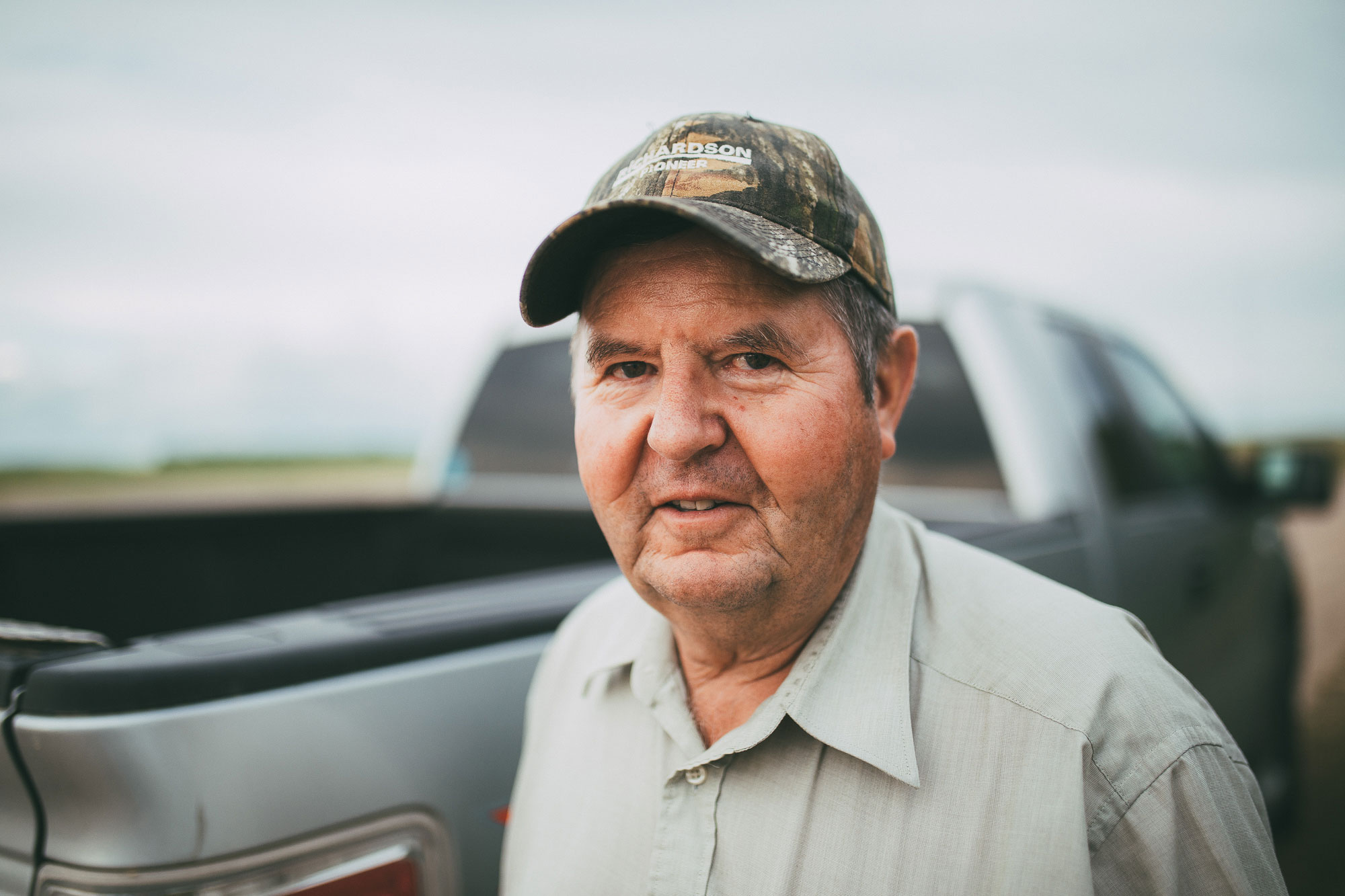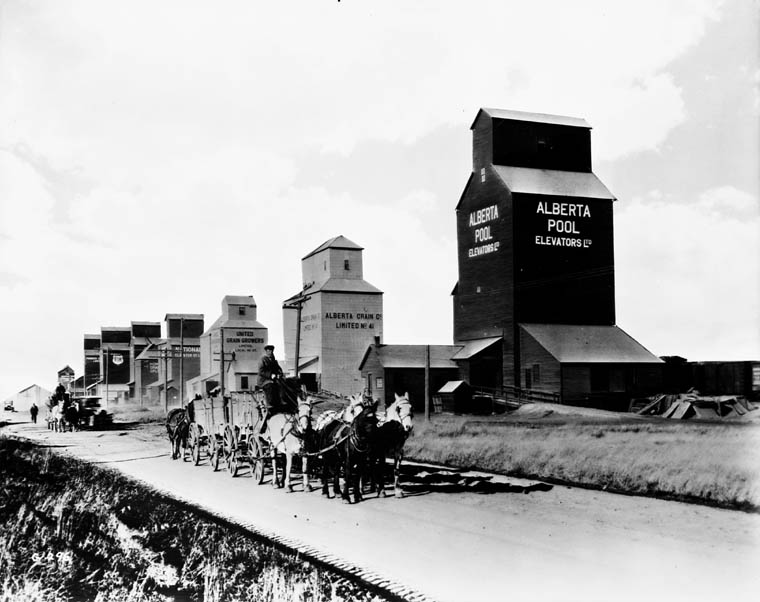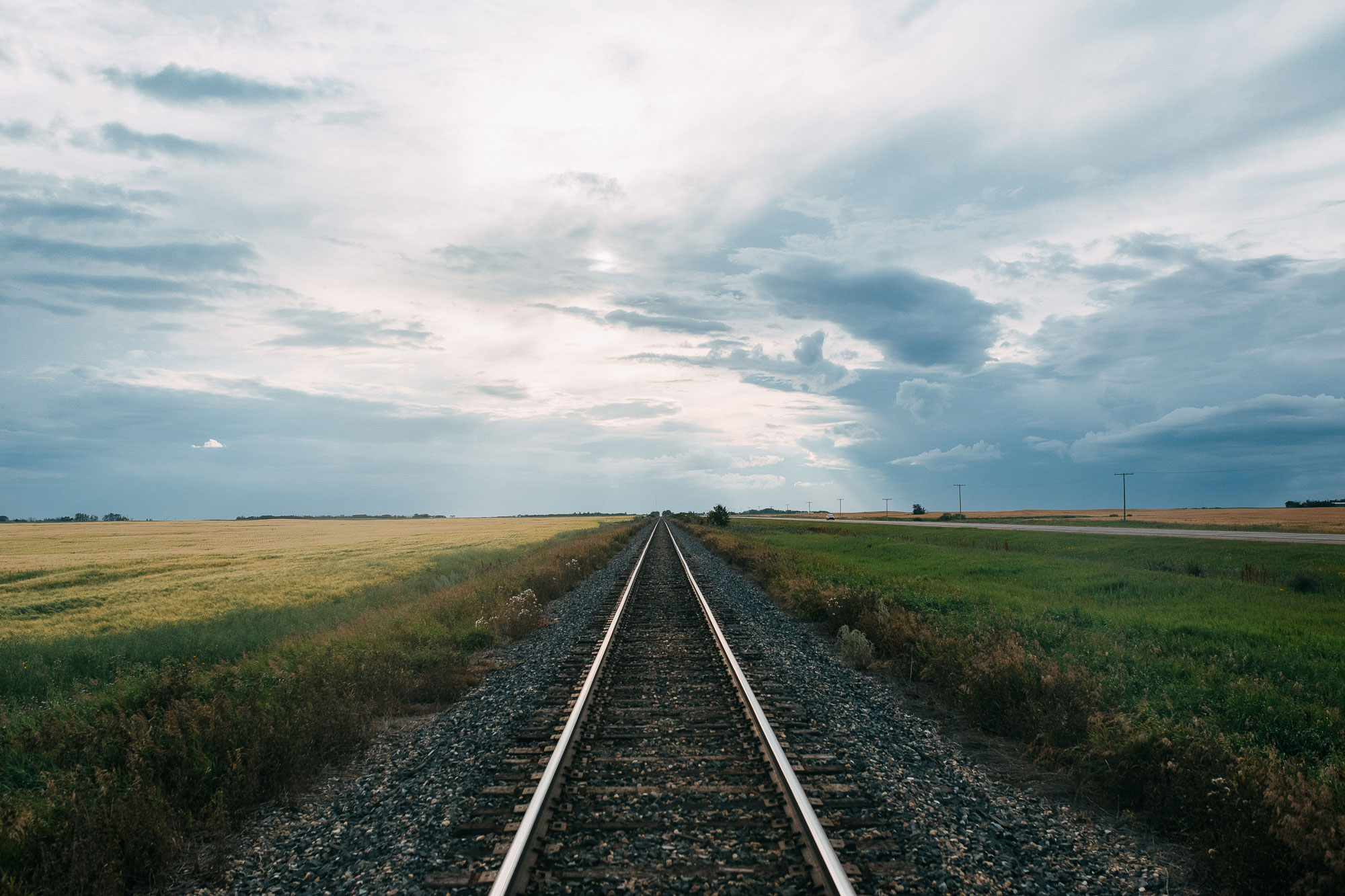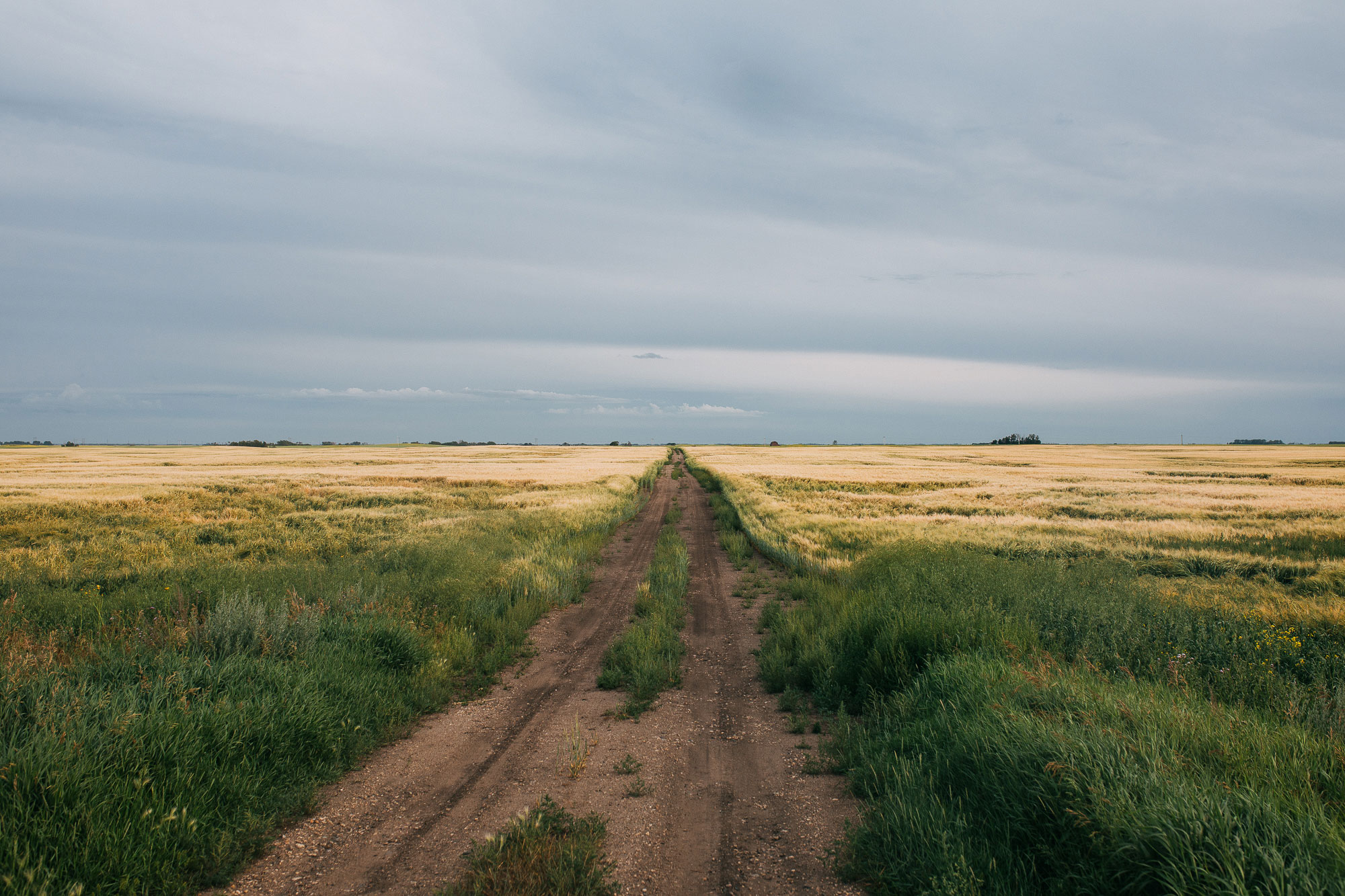I had stopped bicycling and was texting Asad on the phone when Howard pulled off the highway in front of me. He had stopped to check and make sure I was alright, so I asked if he had a bit of free time for me to ask him some questions. He did.
“My name is Howard Benson,” he said. “We’re currently at Jansen, Saskatchewan, a small farming community of about 100 people. A few livestock farms in the area, but predominantly grain farms. We have a potash mine being built a few miles north, which eventually will provide a lot of additional employment.”
He wore a hat with the name of a big agronomy company on it, soil-covered jeans above thick steel-toe boots. As he talked, he folded and unfolded a small penknife in his hands.

In urban culture, the weather is sort of seen as the thing you talk about when you’re not sure what else to say. Among the farmers of Saskatchewan, however, weather is at the forefront of their minds and therefore their conversations. Weather can mean a failed crop. Weather can mean bankruptcy. So that’s where our conversation began.
“With this drought this year, it’s severely cut back total production in the province. There’s areas that didn’t get their crop off last fall because of too much rain, and now there’s the opposite side of the coin,” he told me. “I just heard today that Regina had the hottest July and the dryest month in 132 years. So kind of an extreme situation.”
“It’s going to be a real adjustment for some people who rely on that crop every year to make payments, pay for equipment and pay rent and all that sort of thing.”
I asked Howard if he related the unpredictable weather to climate change. He responded, “It’s nothing new. I think we’re accelerating what’s happening right now but it’s nothing new, in my mind. It’s nothing that hasn’t happened before and it’s not going to be any different going forward.”
In that, I hear something other than climate denial. I hear the hard-earned experience of a farmer who has dealt with unpredictable weather for his entire life. For me, as a relatively urban Canadian citizen, news coverage of extreme weather is a new, climate-related phenomenon. For him, unpredictable and harsh weather is the norm—he has carried the stress of seasonal fluctuation throughout his career.
“’61 was a year it just didn’t rain. I remember that like yesterday. ’80 was dry. ’88 was very dry. There was just minimal crop, you parked a three-ton truck in the middle of a quarter section and combined all day.”
A quarter section is 160 acres, for the record, so that’s barely any harvest. And not that I doubted him, but I looked up drought in the Encyclopedia of Saskatchewan, and his memories are completely accurate. “In 1961—generally considered Saskatchewan’s worst drought year—losses to prairie wheat production alone totaled $668 million. The 1986–88 drought also triggered staggering losses (e.g. a $4 billion drop in grain exports) to Canadian agriculture.”
So simplifying Howard’s words to the denial of climate change isn’t really accurate. He was acknowledging the uncertain weather patterns that the farmers of the Prairies have dealt with for generations, and the devastating losses they have already endured. “We could end up there again,” he said. “But our varieties are better, we’re making better use of our moisture with zero till and direct seedings. Those kinds of things we never had before. I think that’s made a huge difference in these drier years and will in the future going forward.”
One of the most powerful things I’ll remember from this entire conversation was Howard waving. We had pulled off the highway onto the gravel turnoff for the small town of Jansen, and he waved at each of the half-dozen-or-so vehicles that drove in or out. And it wasn’t a cursory gesture. He looked at each one of them, recognized each driver, and waved to them.
He started farming in the area in 1969, basically out of high school. “I started farming with family on the home farm. We had livestock, enough to keep us busy. I was married in the early ’70s and we raised a family there. My son is farming with me now and will take over, I’m sure.”
“I wouldn’t trade it for anything else. A good place to raise a family.”
I asked about the demographic change of rural Saskatchewan, thinking that fewer and fewer people were choosing to become farmers.
“I think the trend has kind of reversed a bit in the last five, eight years,” Howard responded. “The bright lights aren’t quite so appealing anymore for a lot of people that did leave the farm.” He noted the downturn of the oil industry in Alberta, which had for decades drawn a lot of young people from Saskatchewan. But at the end of it, he named the simple pleasure of farming in the place he called home.
“I think the farm has attracted a lot of people back, and we need young people to carry on.”
Howard’s children grew up with him in Jansen, Saskatchewan, and all four of them still live and work in the province. I asked if there’s anything he did to raise kids that have such a love for rural Saskatchewan.
“I just think being exposed to the rural, and then spending time in the city and seeing the stuff that goes on there,” he said. “I mean, the crap that kids get exposed to in the city, it’s not healthy. Girls at ten, eleven years of age, they’re part of gangs already and they’ve got to go out and steal, or beat somebody up, or whatever. I mean, not a good environment to raise a family.”

I spent a while trying to figure out what to say to follow this, because I didn’t want to criticize Howard for speaking his truth. I ended up finding an article in Policy Options that spoke to what I was feeling. “Capital vs. countryside,” Sean Speer wrote, “that’s the new political divide. […] Many of the people in [political] professions live and work in our major cities and socialize with those who have the same lived experience. It is not that they are necessarily dismissive or disdainful about how the rest of the country lives. It is that they do not even know that others live and see the world differently and prioritize different things. It is mostly a case of unthinking neglect rather than outright condescension. But the consequences are often the same.”
“Cultivating a more inclusive and respectful politics is, of course, easier said than done. Empathy is a big part of the solution. We must force ourselves to step out of our respective bubbles and try to understand the experiences and perspectives of others. Folks from Toronto should spend more time in Thunder Bay and vice versa. We may discover we can learn more from listening to different voices.” Sean Speer, The urban/rural divide and a more inclusive Canada
Speer goes on to say that another step towards bridging this divide would be to draw on more federalism and localism to address issues, “so that communities have more autonomy and power to choose their own paths and solutions.” I think this point has merit, especially when I think of Howard’s perception of the proposed national carbon tax. I’ve heard other people deride Saskatchewan’s ‘backwards policy’ of ‘holding out’ against the carbon tax. According to Saskatchewan Environment Minister Scott Moe, however, a $50/tonne carbon tax would amount to $2.5 billion in Saskatchewan, a cost he says Saskatchewan’s export-based economy could not bear. Having talked to Howard and other farmers in Saskatchewan, I believe Moe has a point.
I suppose I’ve digressed from Howard’s point about rural and urban cultures. The point is, these cultures can be vastly different—even within Canada. The way we treat those cultural differences affects our families, our politics and the way we treat our fellow citizens.

Not belonging to Saskatchewan culture myself, I only knew vaguely about the wheat marketing board.
From 1935 to 2012, the Canadian Wheat Board (CWB) held a monopsony on Prairie wheat, meaning that farmers were required to sell their grain through the marketing board. As Jake MacDonald explained in The Globe and Mail, “the CWB’s mandate was to pay farmers a base price for their grain, identify markets, negotiate the best price, deliver the goods, issue advance cheques and make final payment after the crop was sold. If the wheat market went up, farmers pocketed the profits. If the market went down, the government absorbed the loss. Nothing was subtracted from the farmer’s share except the cost of marketing and delivery.”
In the late 2000s, amidst politically charged criticism and support for the CWB, the Harper government dismantled the marketing board in favour of an individual-based marketing system. The arguably sad end to the story of the CWB is that it was sold to a joint venture of multinational corporations headquartered in the United States and Saudi Arabia, despite the attempt of a collective of western Canadian farmers to raise funds to purchase the CWB and keep it owned by Canadian farmers rather than foreign corporations.
Howard, perhaps characteristically of farming culture, was focused on the future. “It had its place,” he said of the CWB. “There are still those that would prefer to operate under that system, but I don’t see it ever coming back. It’s made us become a lot smarter operators, because we’ve had to pay attention to all our costs and know what pencils out and what doesn’t. Keep our eyes open going forward.”
The last thing I asked Howard was if there was anything he wished other Canadians knew about rural Saskatchewan farming, and his answer yet again opened my eyes.
“Well, I wish they would get the facts before making decisions about what’s healthy and what’s not. I walk into the store in cities and I see whole aisles full of ‘organic.’ Do they really know where that’s coming from? A lot of that stuff is imported from Turkey or Morocco or India, and it magically transforms into organic on the boat,” he laughed, “somewhere between here and there.”
Then he got serious.
“I wouldn’t feed anything to anybody that I wouldn’t eat myself. We’re not organic, but two thirds of the world would starve if the whole world was strictly organic, because production would be so reduced.”
He also spoke about genetically modified crops (GMOs), and his point was simple. “We use far less chemical with GMOs than we ever did before. And a lot healthier, less toxic than it was. Compared to stuff we used to use in the ’70s, it’s far smarter, far safer.”
In many urban cultures, organic and non-GMO are catchwords for healthy eating. Opening my eyes to the reality of large-scale agriculture—the kind of agriculture that is necessary to feed the world—means looking at those words differently. Organic food has a price that had never occurred to me.


Throughout this journey I’ve been exposed to pieces of Canadian culture that I could not really have imagined, from a lobster fisherman’s boat to an almost-forgotten Québécois barn and elsewhere. My conversation with Howard is just the latest reminder that Canada is diverse, and complicated, and it takes real work and authentic conversations to begin to bridge the gaps between these different pieces. I can’t begin to list the things I didn’t know about farming in western Canada before talking to Howard. So I challenge you to look around at the ignorance or the stereotypes that you—just like me—might be taking for granted. And I challenge you to ask.
Photo from The Canadian Encyclopedia. I didn’t have time to go over them in detail, but two long-read articles about the aftermath of the dismantling of the CWB looked very relevant to understanding farmers’ experiences in the last half decade: Why so many farmers miss the Wheat Board, published following the bumper crop and grain transportation crisis of 2013; and A rich harvest: How the Canadian Wheat Board’s demise unleashed a grain bonanza, published in 2016 following the expansion and stabilization of the grain transportation industry.